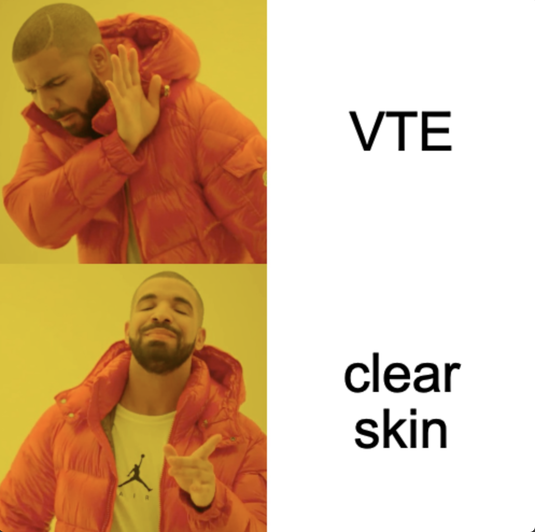THIRTIETH ISSUE
March 15, 2023
Prognostic Value of Cutaneous Disease Severity Estimates on Survival Outcomes in Patients With Chronic Graft-vs-Host Disease
JAMA Dermatology
JAMA Dermatology
Chronic GVHD patients will survive!
It is well established that there is a correlation between chronic graft-versus-host disease (cGVHD) and mortality. However, risk stratification tools to aid in predicting survival outcomes are lacking. This multicenter, prospective, cohort study evaluated 469 adults and children with cGVHD requiring systemic immunosuppression to determine whether body surface area (BSA) and NIH Skin Score could be used to risk stratify patients with cGVHD when separated by cGVHD subtype. Prognostic models were adjusted for age, race, conditioning intensity, patient sex, and donor sex.
What did they find?
Main Takeaways: Increased risk of mortality is seen among cGVHD patients with the erythema subtype. BSA is more useful than NIH skin score in predicting survival outcomes among these patients.
It is well established that there is a correlation between chronic graft-versus-host disease (cGVHD) and mortality. However, risk stratification tools to aid in predicting survival outcomes are lacking. This multicenter, prospective, cohort study evaluated 469 adults and children with cGVHD requiring systemic immunosuppression to determine whether body surface area (BSA) and NIH Skin Score could be used to risk stratify patients with cGVHD when separated by cGVHD subtype. Prognostic models were adjusted for age, race, conditioning intensity, patient sex, and donor sex.
What did they find?
- Slightly over half (57%) of patients with cGVHD had skin involvement at enrollment. An additional 19% had subsequent skin involvement develop during the study period
- Erythema-type cGVHD had earlier disease onset, but was more responsive to treatment than sclerosis-type
- Erythema-type cGVHD was associated with increased risk of non-relapse mortality (NRM) and decreased overall survival (OS) when stratified by BSA [NRM: HR 1.33 per 10% BSA increase, 95% CI 1.14-1.44, p<0.001; OS: HR 1.33 per 10% BSA increase, 95% CI 1.14-1.44, p<0.001]
- The model using erythema BSA accounted for 75% of total prognostic information for NRM (vs. 38% NIH Skin Score) and 73% of OS (vs. 58% NIH Skin Score)
Main Takeaways: Increased risk of mortality is seen among cGVHD patients with the erythema subtype. BSA is more useful than NIH skin score in predicting survival outcomes among these patients.
Use of spironolactone for acne treatment does not appear to increase risk of venous thromboembolism
Journal of the American Academy of Dermatology
Spironolactone is on your side– it won’t be “clotting” against you!
Spironolactone, an aldosterone receptor antagonist, is a mainstay in the treatment of hormonal acne. It is molecularly similar to drospirenone, a component of some combined oral contraceptives (COCs), which has been linked to increased risk of venous thromboembolism (VTE).
Could spironolactone also cause increased risk of VTE? Researchers matched 33,543 biologically female patients treated with spironolactone for acne with 33,543 biologically female patients treated with a tetracycline for acne and assessed the probability of VTE development within 60 days.
What did they find?
Main Takeaway: Patients treated with spironolactone for acne were not more likely to develop VTE than matched patients treated with tetracycline antibiotics for acne.
Spironolactone, an aldosterone receptor antagonist, is a mainstay in the treatment of hormonal acne. It is molecularly similar to drospirenone, a component of some combined oral contraceptives (COCs), which has been linked to increased risk of venous thromboembolism (VTE).
Could spironolactone also cause increased risk of VTE? Researchers matched 33,543 biologically female patients treated with spironolactone for acne with 33,543 biologically female patients treated with a tetracycline for acne and assessed the probability of VTE development within 60 days.
What did they find?
- Cohorts were matched for age and COC use
- Study demographics included a mean age of 30.9 (SD 11.3); 8.6% used COCs
- The spironolactone cohort was NOT more likely to develop DVT (OR 0.57; 95% CI 0.31-1.06) or PE (OR 0.60; 95% CI 0.26-1.37) than the tetracycline cohort
Main Takeaway: Patients treated with spironolactone for acne were not more likely to develop VTE than matched patients treated with tetracycline antibiotics for acne.
Bimekizumab efficacy and safety in patients with moderate-to-severe plaque psoriasis who switched from adalimumab, ustekinumab or secukinumab: results from phase III/IIIb trials
British Journal of Dermatology
Thank you, next!
Biologics have had a major impact in treatment options for patients with moderate to severe psoriasis, but they definitely aren’t perfect. Biologic fatigue is an established phenomenon that happens when a person loses response to a biologic over time. Therefore, switching biologics may be necessary to continue to treat chronic inflammatory disorders, such as psoriasis. In this study, the authors investigated the efficacy and safety of switching from adalimumab (TNF-a inhibitor), ustekinumab (IL-12/23 inhibitor), or secukinumab (IL-17A inhibitor) to bimekizumab (IL-17A/IL-17F inhibitor) for the treatment of psoriasis.
What did they find?
Main findings: A majority of patients who did not successfully respond to adalimumab, ustekinumab, or secukinumab had improvement in their psoriasis symptoms without new safety concerns after switching to bimekizumab.
Biologics have had a major impact in treatment options for patients with moderate to severe psoriasis, but they definitely aren’t perfect. Biologic fatigue is an established phenomenon that happens when a person loses response to a biologic over time. Therefore, switching biologics may be necessary to continue to treat chronic inflammatory disorders, such as psoriasis. In this study, the authors investigated the efficacy and safety of switching from adalimumab (TNF-a inhibitor), ustekinumab (IL-12/23 inhibitor), or secukinumab (IL-17A inhibitor) to bimekizumab (IL-17A/IL-17F inhibitor) for the treatment of psoriasis.
What did they find?
- 68% of patients who did not respond to adalimumab achieved Psoriasis Area and Severity Index (PASI) 90 within 4 weeks of switching to bimekizumab. After 48 weeks, the proportion climbed to 91%
- 79% of patients who did not respond to ustekinumab achieved PASI 90 within 4 weeks of switching to bimekizumab. After 48 weeks, 90% achieved PASI 90
- 53% of patients who did not respond to secukinumab achieved PASI 90 within 4 weeks of switching to bimekizumab. After 48 weeks, 79% achieved PASI 90
- Adverse effects related to bimekizumab were mild to moderate, and exposure-adjusted incidence rates were similar between periods prior to and after the switch to bemukizumab
Main findings: A majority of patients who did not successfully respond to adalimumab, ustekinumab, or secukinumab had improvement in their psoriasis symptoms without new safety concerns after switching to bimekizumab.
sk(in depth) scoop
Solid-organ transplant patients are 50 times more likely to develop keratinocyte skin cancers (i.e. squamous and basal cell carcinomas) due to immunosuppressive regimens, which halt antitumor immune responses. Since nicotinamide (vitamin B3) has been shown to reduce development of keratinocyte cancers in immunocompetent patients, the authors in this study investigated if it has the same skin cancer reducing impact in transplant patients.
What did they find in the ONTRANS trial?
- 158 participants in this phase 3, multicenter, double blind, randomized, placebo-controlled trial (79 in nicotinamide group and 79 in placebo group)
- Did NOT show significant effect of nicotinamide therapy on the number of keratinocyte cancers at 12 months
- 2.6 +/- 3.2 keratinocyte cancers per participant in nicotinamide group and 2.7 +/- 3.4 in the placebo group
- 207 new keratinocyte cancers in transplant group and 210 in placebo group (p=0.96)
- The two groups had similar adverse events, which were mainly infection and infestations (i.e. respiratory, urinary tract and skin infections)
Main takeaway:
- The ONTRANS trial found that oral nicotinamide therapy in immunosuppressed solid-organ transplant patients did not reduce development of keratinocyte carcinomas
QUESTION OF THE WEEK
NEJM IMAGE CHALLENGE
Click directly on your answer choice to see the correct answer and explanation!



